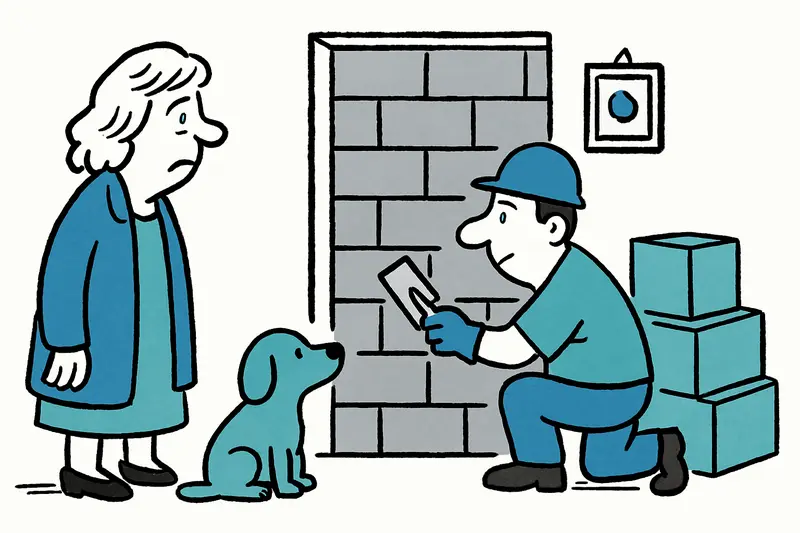In Palma, an elderly tenant was evicted from a basement room. Left behind were belongings in the hallway, an old dog, and many unanswered questions.
In the hallway, only boxes and a dog remain
Thursday afternoon on Joan-Miró Street: workers lay the final concrete slab in front of a door, a sign from the security company is mounted, and a woman in her sixties stands nearby, staring and not quite understanding. This is not a scene from a drama; this is city daily life.
The woman—let's call her Reina, because that's her name and because it feels right—has spent her life in one of the basement rooms. There was barely room for everything: a bed, a small table, a cooking stove, a lamp that sometimes flickers. Her dog Luna, blind and small, shuffled between crates until a neighbor picked her up. Anyone who saw this couldn't simply walk away.
Why does this happen?
Behind such evictions are often complicated stories: months of rent arrears, legal disputes, and owners enforcing their rights. In this case, locals say the process was quick, and many felt overwhelmed. 'The lawyer said on Tuesday the eviction would be on Thursday,' says an activist who was there before seven in the morning. Not a lot of time to organize.
The people living there are not faceless figures: delivery drivers, waiters from Santa Catalina, care workers, construction workers. They work—often in shifts—and still cannot find an affordable alternative in Palma. The number of emergency shelters is insufficient, and many decline the offer because they do not want to lose their small, barely furnished rooms.
Between horror and resignation
The scene was loud, tense and sad. Police, lawyers, representatives of a security company, an ambulance, activists with banners. A woman fainted, paramedics provided first aid. In the end, there remained a hallway full of boxes, a bricked-up entrance and questions that no one answered: Where should the people go now? Who will look after Luna? Who will pay for the furniture now standing in the corridor?
The city administration points to legal requirements and emergency shelters. Social organizations try to fill gaps, but are often overwhelmed. Neighbors bring water, a woman gives a blanket. Small gestures that at the moment barely suffice.
What remains?
This case is not an isolated incident. It stands as a symbol for a larger problem: rising rents, too little affordable housing, and people who, despite work, do not make ends meet. When the doors are bricked up, not only cement remains, but also disappointment—and a dog who misses a familiar smell.
In the evening I walked down the street again. The security company's plaque gleamed in the headlights. A neighbor spoke softly: 'Tomorrow is a new case.' That says more than any statistic.
Similar News

Ibiza: Clubs Hosted Closing Parties Despite Weather Warning
Despite an official weather warning and calls to postpone large events, several Ibiza clubs held the closing parties. Pu...

Nearly Eight Tonnes of Garbage Recovered from the Sea Off the Balearic Islands
In September, nearly eight tonnes of waste were collected from the waters off the Balearic coasts. Boats around Mallorca...

Unified Taxi Tariff Now Also in Binissalem and Llubí
Binissalem and Llubí have joined the unified taxi network. Passengers should get a taxi faster, and drivers will be allo...

Constant Rain Instead of Autumn Sun: What Vacationers Should Expect on Mallorca
With Storm System Alice, there is currently no beach weather in sight on Mallorca. Weather warnings, flooded roads, and ...

Autumn Rain in Alcúdia: Mild Day with Showers on October 13, 2025
Light to moderate rain marks October 13 in Alcúdia. Despite clouds, temperatures stay unusually mild – ideal for a relax...
